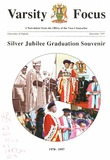| dc.contributor.author | University of Nairobi | |
| dc.date.accessioned | 2013-09-27T06:45:43Z | |
| dc.date.available | 2013-09-27T06:45:43Z | |
| dc.date.issued | 1997-12 | |
| dc.identifier.uri | http://www.uonbi.ac.ke/newsletter | |
| dc.identifier.uri | http://hdl.handle.net/11295/56998 | |
| dc.description | A Newsletter from the Office of the Vice-Chancellor - Full text | en |
| dc.description.abstract | From the Vice-Chancellor's Desk
The University of Nairobi has within the last 25 years of existence distinguished itself as an Institution of Higher Learning per excellence with one of the highest academic standards in the country. It is certainly regarded by many as a highly reputable institution, one of the best and finest in the land and region.
What distinguishes this University from others is the strict academic discipline and tradition infused and the solid foundation laid right at the primary stages. We have at the University's teaching and research programmes, some of the best brains in the country and indeed comparable to any in the international community. It is through the efforts of these respected men and women that our University has become what it is today - a fine University with remarkable achievements that hold every promise for greatness and marches steadily into the path of honor and glory as we enter the 21st millennium.
We, as a University must therefore he prepared to meet the challenges of the Nation in the next Millennium. Since its inception, the University of Nairobi was given the mission of producing high level manpower to assist and participate in the development of Kenya. In addition, a University is a place for the discovery, processing, dissemination and storage of knowledge; a mission the University of Nairobi has endeavoured to achieve with
considerable success.
As we approach the end of the 20th century and enter the next millennium, University of Nairobi must play its role in the industrialization of this country. The Sessional Paper of 1997 on Industrial Transformation to the Year 2020, explains why Kenya must industrialize. We as a country, need to address the problems of poverty and unemployment. Given that about 43 per cent of Kenya's population live below the poverty line and that per capita GDP in 1995 stood at US $275, it has been recognized that jobs can only be created and sustained through encouragement of efficient industries which are internationally competitive through utilization of the latest technology.
Industrialization is not an end in itself but a means to accelerate the country's economic resources to broaden the economy and generate a vibrant industrial sector based on primary processing, manufacturing, commerce and services.
Experience shows that rapid and sustained growth for Kenya cannot be achieved in the absence of industrialization.
Experience has also shown that no country has industrialized without using its education and training institutions particularly universities. A task in which, University of Nairobi, being the country's oldest and biggest public university, has no choice but to provide the requisite lead.
Prof. F.J. Gichaga | en |
| dc.description.sponsorship | University of Nairobi | en |
| dc.language.iso | en | en |
| dc.publisher | Office of the Vice-Chancellor, University of Nairobi, | en |
| dc.subject | University of Nairobi | en |
| dc.subject | Varsity Focus | en |
| dc.subject | Silver Jubilee Graduation | en |
| dc.subject | Infrastructure projects | en |
| dc.subject | Inaugural lectures | en |
| dc.subject | University of Nairobi Anthem | en |
| dc.subject | Change of Guard | en |
| dc.title | Varsity Focus (December 1997) | en |
| dc.type | Book | en |
| local.publisher | Public Relations Department | en |

